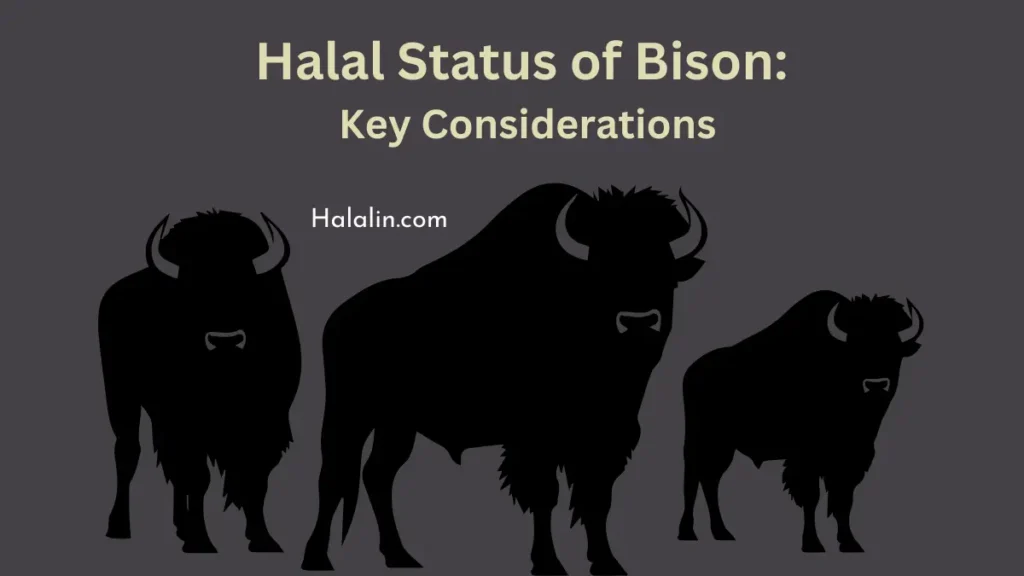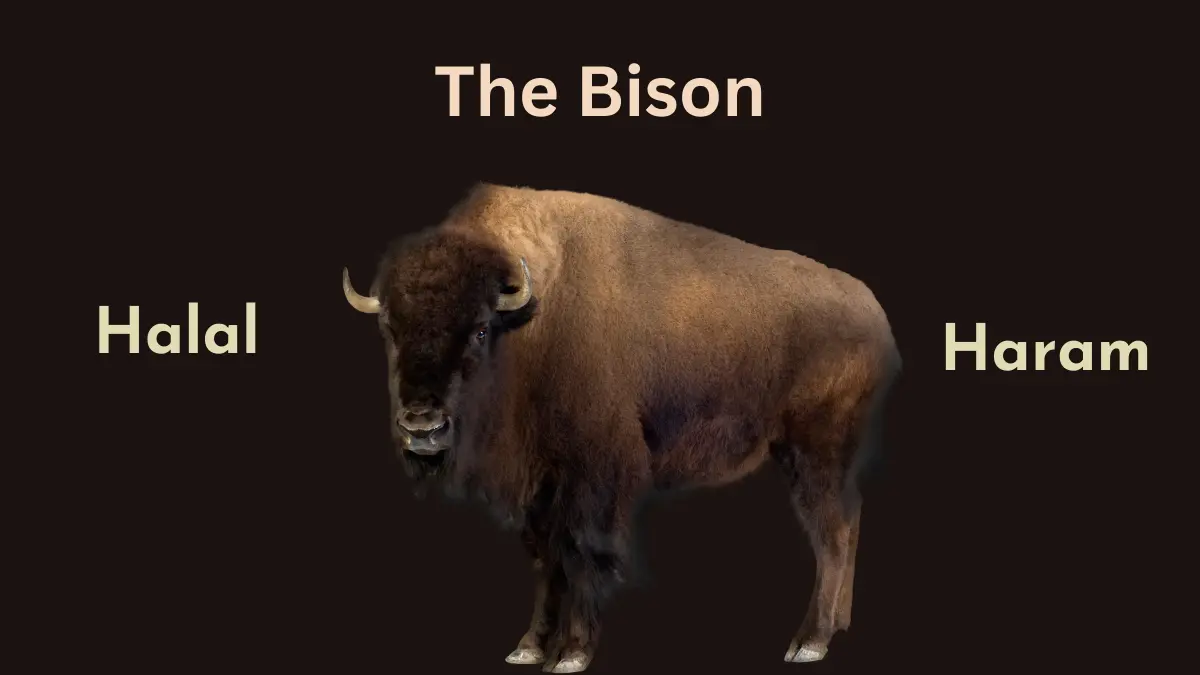Bison meat, also known as American buffalo meat, has gained popularity for its nutritional benefits and distinct flavor. For Muslims adhering to halal dietary guidelines, understanding the permissibility of consuming bison meat is essential. This article provides a detailed analysis, addressing key considerations and offering insights from Islamic scholars.
What is Bison Meat?
Bison meat comes from the American bison, known for its leaner profile and slightly sweeter taste compared to beef. It is valued for its high protein content and lower fat levels, making it a healthy choice for many consumers.
Halal Guidelines for Meat Consumption
In Islam, “halal” refers to what is permissible or lawful according to Islamic law (Shariah). For meat to be considered halal, it must meet specific criteria:
- Slaughter Method: The animal must be slaughtered by a Muslim who pronounces the name of Allah (God) at the time of slaughter. This act, known as “Zabiha,” ensures the meat is ritually slaughtered according to Islamic principles.
- Animal’s Condition: The animal must be healthy and free from disease at the time of slaughter.
- Blood Draining: Proper blood drainage is essential post-slaughter, as consuming blood is prohibited in Islam.
- Halal Certification: In some regions, halal certification from recognized Islamic authorities is required to ensure compliance with halal standards.
Is Bison Halal?
To determine the halal status of bison meat, we evaluate it based on the above criteria:
- Slaughter Method: Bison meat can be halal if slaughtered by a Muslim following Islamic guidelines. The slaughtering must include reciting the name of Allah (God).
- Animal’s Condition: The bison must be in good health at the time of slaughter, free from any illness or disease.
- Blood Draining: Ensuring proper blood drainage post-slaughter is crucial to meet halal requirements.
Scholarly Opinions on Bison Meat
Islamic scholars have discussed the permissibility of consuming bison meat within the framework of halal guidelines. According to many scholars:
- Sheikh Yusuf Qaradawi, a prominent Islamic scholar, states that bison meat is permissible (halal) as long as it is slaughtered according to Islamic guidelines.
- The Islamic Food and Nutrition Council of America (IFANCA) and other halal certification bodies certify bison meat as halal when processed according to Islamic standards.
Challenges and Practical Considerations
While bison meat may meet Islamic criteria theoretically, there are practical considerations:
- Availability: Bison meat may not be widely available in regions with Muslim populations, impacting access to halal-certified options.
- Certification: It is essential to ensure bison meat is halal-certified by reputable authorities to guarantee compliance with Islamic dietary laws.
- Cross-Contamination: Cross-contamination during processing and handling with non-halal meats is a concern, highlighting the importance of strict adherence to halal practices.
Halal Status of Bison: Key Considerations

Type of Animal
Bison falls under the category of animals that are generally permissible to eat in Islam, similar to cattle and sheep. There are no specific restrictions in Islamic texts that classify bison as haram.
Slaughtering Process
The most critical factor in determining whether bison meat is halal is the slaughtering process. The animal must be slaughtered according to Islamic guidelines, which includes invoking the name of Allah, using a sharp knife, and ensuring the blood is fully drained from the body.
Certification and Sources
When purchasing bison meat, it is important to look for halal certification from a recognized Islamic authority. This certification ensures that the meat has been processed according to Islamic dietary laws. Always check the source and ensure that the meat is from a reputable supplier.
Benefits of Eating Bison
Bison meat is not only permissible in Islam (if slaughtered correctly) but also offers numerous health benefits. It is leaner than beef, rich in essential nutrients, and free from antibiotics and hormones commonly found in industrial meat production.
Common Misconceptions
There are some misconceptions about bison meat and its Islamic status. Some people mistakenly believe that because bison is not a common livestock animal, it cannot be halal. However, as long as the animal is slaughtered according to Islamic guidelines, the meat is halal.
FAQs About Bison Meat
Is Bison Meat Healthier Than Beef?
Yes, bison meat is generally healthier than beef. It is lower in fat and calories and higher in protein, making it a better option for those looking to maintain a healthy diet.
How Can I Ensure the Bison Meat I Buy is Halal?
To ensure that the bison meat you buy is halal, look for halal certification from a recognized Islamic authority. Purchase from reputable suppliers who adhere to Islamic dietary laws.
Is There a Difference Between Halal and Kosher Meat?
Yes, there are differences between halal and kosher slaughtering practices. While both require specific methods of slaughtering, the prayers and blessings invoked are different. Halal meat must follow Islamic guidelines, while kosher meat must follow Jewish dietary laws.
Can Bison Be Found in Halal Restaurants?
Yes, some restaurants do offer bison meat. However, it is less common than other meats like chicken, beef, or lamb. Always check with the restaurant to ensure that the bison meat they serve is halal-certified.
Final Thoughts
Understanding the halal status of different types of meat is essential for practicing Muslims. Bison, when slaughtered correctly, is a permissible and healthy option. Always seek out halal certification and reputable suppliers to ensure that the meat you consume adheres to Islamic dietary laws.
Conclusion
In conclusion, the question “Is Bison Halal?” revolves around its sourcing, processing, and adherence to Islamic dietary laws. Based on the analysis of how bison meat is sourced and processed, along with the considerations of Islamic dietary guidelines, bison meat is generally considered Halal when the slaughtering process meets the requirements of zabiha halal.
This article has explored various aspects related to the Islamic status of bison meat, covering its origins, processing methods, and compliance with Islamic principles. Understanding these factors helps ensure that Muslims can make informed choices when considering bison meat as part of their diet.
By providing a comprehensive analysis and answering the query definitively, this article aims to assist readers in understanding the status of bison meat more thoroughly. For those seeking Islamic options in their dietary choices, bison meat, when sourced and processed correctly, can indeed be considered halal.

